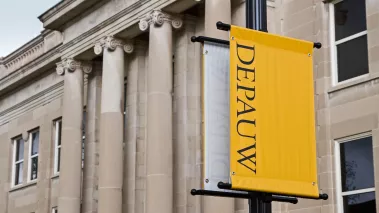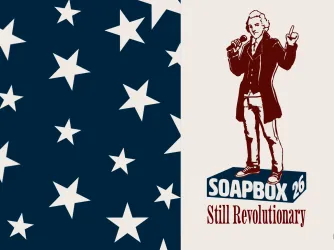Table of Contents
Started from the bottom, now it’s here: DePauw soars up rankings after improving speech codes

Jim West / Alamy Stock Photo
Nobody likes to be last.
In 2021, DePauw University had the lowest score of all 159 schools in FIRE’s College Free Speech Rankings. Fast forward to the 2024 College Free Speech Rankings: DePauw has secured a spot inside the top 50, landing at 41 and surpassing nearly every other liberal arts college (only Washington and Lee University performed better).
So, what has driven this vast improvement? Speech code revisions.
In 2021, DePauw earned FIRE’s worst, “red light” rating for its written policies on student expression. The university maintained restrictive policies on various expressive outlets for students, from electronic communications to posting of fliers. After working collaboratively with FIRE, DePauw revised six policies. Due to these policy changes, it earned an overall “green light” speech code rating, meaning it has no policies that seriously restrict or chill speech. DePauw has also launched various free speech initiatives on campus, adopting a comprehensive statement on free expression, and educating students on free speech from day one.
It was the speech code rating improvement, however, that paved the way for DePauw’s huge jump in the rankings this year. The rankings incorporate a school’s speech code rating and affect a schools’ overall score due to the important impact written policies have on a campus’ free speech climate in FIRE’s estimation — if a school maintains clearly restrictive policies, it makes it all too easy for administrators to apply them abusively against disfavored speech. Further, many students don’t even know these policies are on the books, and if they’re unaware of their rights, they may be robbed of the opportunity to fully express themselves without even knowing it.
Critically, “yellow light” and red light policies at public institutions are unconstitutional. At private universities, maintaining these policies stands in direct opposition to the institutions’ promises of free speech (which nearly all private colleges make) and, in some states, violates an implied contract between student and university. Improving written policies also may impact other metrics used in the rankings, such as student perception of administrative support for free speech.
DePauw’s ascension to the top 50 is a prime example of how schools can improve their standing in the rankings from year to year. Improving speech codes is no magic elixir, however. In fact, we’ve seen (and drawn public attention to) schools with good written policies violating student and faculty rights.
DePauw’s improvement is laudable, and it serves as a model for the large number of schools that still need to improve their policies.
And a green light speech code rating does not insulate schools from FIRE criticism: In 2023 alone, FIRE drew attention to the gap between University of California Los Angeles’ green light rating and its poor speech climate, highlighting the alumni who are working to improve the speech climate so that it better reflects its rating. FIRE also publicly challenged the University of Florida when it vowed to investigate students over protected speech, and we named Texas A&M one of the 10 worst schools for free speech, writing to the administration this summer over two separate faculty incidents.
Maintaining good speech policies is a necessary, but not sufficient part of a good climate for free speech. But FIRE would be remiss if we did not commend schools for getting that singular part right, especially when so few schools across the country have done so.

Spotlight on Speech Codes
FIRE surveys speech codes at America’s top colleges and universities, providing readers with key data on individual schools and national trends.
Indeed, according to FIRE’s 2023 Spotlight on Speech Codes report, only 12.3% of the 486 schools we reviewed earned an overall green light rating like DePauw. A whopping 66.7% of institutions earned a yellow light rating, meaning they maintain at least one policy that restricts a more limited amount of protected expression or, by virtue of vague wording, can too easily be used to restrict protected expression. 19.3% earned an unenviable red light rating for maintaining the most restrictive policies, and 1.6% earned a “Warning” designation, meaning they do not promise freedom of speech at all.
DePauw’s improvement is laudable, and it serves as a model for the large number of schools that still need to improve their policies. Fortunately, schools with interest in doing so know where to turn. FIRE is here to help these schools take the first step toward building and strengthening their speech climates: revising their written policies.
FIRE stands ready to work with public institutions whose policies don’t align with their obligations under the First Amendment, and private schools whose policies fail to live up to their promises of freedom of expression. We regularly work with colleges and universities — free of charge — to ensure their policies meet First Amendment standards.
Contact FIRE’s campus Policy Reform team today at speechcodes@thefire.org.
Recent Articles
Get the latest free speech news and analysis from FIRE.

TICKETS ON SALE: Step up to the Soapbox in Philadelphia, Nov. 4-6, 2026

The secret war against student journalists

The Federal Bureau of Investigation (of protected speech)



